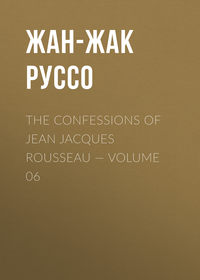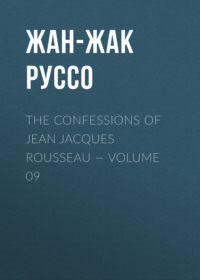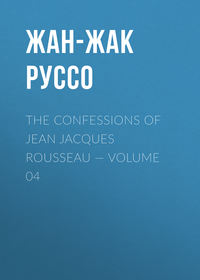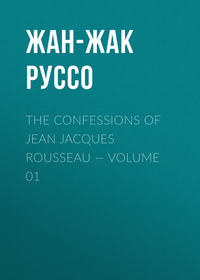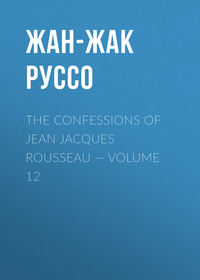 полная версия
полная версияПолная версия
The Confessions of Jean Jacques Rousseau — Complete
I judged this motive to be of the same nature with the project into which they had attempted to make the daughter enter, by promising to procure her and her mother, by means of Madam d’Epinay, a salt huckster’s license, or snuff-shop; in a word, by tempting her with the allurements of gain. They had been told that, as I was not in a situation to do anything for them, I could not, on their account, do anything for myself. As in all this I saw nothing but good intentions, I was not absolutely displeased with them for it. The mystery was the only thing which gave me pain, especially on the part of the old woman, who moreover daily became more parasitical and flattering towards me. This, however, did not prevent her from reproaching her daughter in private with telling me everything, and loving me too much, observing to her she was a fool and would at length be made a dupe.
This woman possessed, to a supreme degree, the art of multiplying the presents made her, by concealing from one what she received from another, and from me what she received from all. I could have pardoned her avarice, but it was impossible I should forgive her dissimulation. What could she have to conceal from me whose happiness she knew principally consisted in that of herself and her daughter? What I had done for the daughter I had done for myself, but the services I rendered the mother merited on her part some acknowledgment. She ought, at least, to have thought herself obliged for them to her daughter, and to have loved me for the sake of her by whom I was already beloved. I had raised her from the lowest state of wretchedness; she received from my hands the means of subsistence, and was indebted to me for her acquaintance with the persons from whom she found means to reap considerable benefit. Theresa had long supported her by her industry, and now maintained her with my bread. She owed everything to this daughter, for whom she had done nothing, and her other children, to whom she had given marriage portions, and on whose account she had ruined herself, far from giving her the least aid, devoured her substance and mine. I thought that in such a situation she ought to consider me as her only friend and most sure protector, and that, far from making of my own affairs a secret to me, and conspiring against me in my house, it was her duty faithfully to acquaint me with everything in which I was interested, when this came to her knowledge before it did to mine. In what light, therefore, could I consider her false and mysterious conduct? What could I think of the sentiments with which she endeavored to inspire her daughter? What monstrous ingratitude was hers, to endeavor to instil it into her from whom I expected my greatest consolation?
These reflections at length alienated my affections from this woman, and to such a degree that I could no longer look upon her but with contempt. I nevertheless continued to treat with respect the mother of the friend of my bosom, and in everything to show her almost the reverence of a son; but I must confess I could not remain long with her without pain, and that I never knew how to bear restraint.
This is another short moment of my life, in which I approached near to happiness without being able to attain it, and this by no fault of my own. Had the mother been of a good disposition we all three should have been happy to the end of our days; the longest liver only would have been to be pitied. Instead of which, the reader will see the course things took, and judge whether or not it was in my power to change it.
Madam le Vasseur, who perceived I had got more full possession of the heart of Theresa, and that she had lost ground with her, endeavored to regain it; and instead of striving to restore herself to my good opinion by the mediation of her daughter attempted to alienate her affections from me. One of the means she employed was to call her family to her aid. I had begged Theresa not to invite any of her relations to the Hermitage, and she had promised me she would not. These were sent for in my absence, without consulting her, and she was afterwards prevailed upon to promise not to say anything of the matter. After the first step was taken all the rest were easy. When once we make a secret of anything to the person we love, we soon make little scruple of doing it in everything; the moment I was at the Chevrette the Hermitage was full of people who sufficiently amused themselves. A mother has always great power over a daughter of a mild disposition; yet notwithstanding all the old woman could do, she was never able to prevail upon Theresa to enter into her views, nor to persuade her to join in the league against me. For her part, she resolved upon doing it forever, and seeing on one side her daughter and myself, who were in a situation to live, and that was all; on the other, Diderot, Grimm, D’ Holbach and Madam d’Epinay, who promised great things, and gave some little ones, she could not conceive it was possible to be in the wrong with the wife of a farmer-general and baron. Had I been more clear sighted, I should from this moment have perceived I nourished a serpent in my bosom. But my blind confidence, which nothing had yet diminished, was such that I could not imagine she wished to injure the person she ought to love. Though I saw numerous conspiracies formed on every side, all I complain of was the tyranny of persons who called themselves my friends, and who, as it seemed, would force me to be happy in the manner they should point out, and not in that I had chosen for myself.
Although Theresa refused to join in the confederacy with her mother, she afterwards kept her secret. For this her motive was commendable, although I will not determine whether she did it well or ill. Two women, who have secrets between them, love to prattle together; this attracted them towards each other, and Theresa, by dividing herself, sometimes let me feel I was alone; for I could no longer consider as a society that which we all three formed.
I now felt the neglect I had been guilty of during the first years of our connection, in not taking advantage of the docility with which her love inspired her, to improve her talents and give her knowledge, which, by more closely connecting us in our retirement would agreeably have filled up her time and my own, without once suffering us to perceive the length of a private conversation. Not that this was ever exhausted between us, or that she seemed disgusted with our walks; but we had not a sufficient number of ideas common to both to make ourselves a great store, and we could not incessantly talk of our future projects which were confined to those of enjoying the pleasures of life. The objects around us inspired me with reflections beyond the reach of her comprehension. An attachment of twelve years’ standing had no longer need of words: we were too well acquainted with each other to have any new knowledge to acquire in that respect. The resource of puns, jests, gossiping and scandal, was all that remained. In solitude especially is it, that the advantage of living with a person who knows how to think is particularly felt. I wanted not this resource to amuse myself with her; but she would have stood in need of it to have always found amusement with me. The worst of all was our being obliged to hold our conversations when we could; her mother, who become importunate, obliged me to watch for opportunities to do it. I was under constraint in my own house: this is saying everything; the air of love was prejudicial to good friendship. We had an intimate intercourse without living in intimacy.
The moment I thought I perceived that Theresa sometimes sought for a pretext to elude the walks I proposed to her, I ceased to invite her to accompany me, without being displeased with her for not finding in them so much amusement as I did. Pleasure is not a thing which depends upon the will. I was sure of her heart, and the possession of this was all I desired. As long as my pleasures were hers, I tasted of them with her; when this ceased to be the case I preferred her contentment to my own.
In this manner it was that, half deceived in my expectation, leading a life after my own heart, in a residence I had chosen with a person who was dear to me, I at length found myself almost alone. What I still wanted prevented me from enjoying what I had. With respect to happiness and enjoyment, everything or nothing, was what was necessary to me. The reason of these observations will hereafter appear. At present I return to the thread of my narrative.
I imagined that I possessed treasures in the manuscripts given me by the Comte de St. Pierre. On examination I found they were a little more than the collection of the printed works of his uncle, with notes and corrections by his own hand, and a few other trifling fragments which had not yet been published. I confirmed myself by these moral writings in the idea I had conceived from some of his letters, shown me by Madam de Crequi, that he had more sense and ingenuity than at first I had imagined; but after a careful examination of his political works, I discerned nothing but superficial notions, and projects that were useful but impracticable, in consequence of the idea from which the author never could depart, that men conducted themselves by their sagacity rather than by their passions. The high opinion he had of the knowledge of the moderns had made him adopt this false principle of improved reason, the basis of all the institutions he proposed, and the source of his political sophisms. This extraordinary man, an honor to the age in which he lived, and to the human species, and perhaps the only person, since the creation of mankind, whose sole passion was that of reason, wandered in all his systems from error to error, by attempting to make men like himself, instead of taking them as they were, are, and will continue to be. He labored for imaginary beings, while he thought himself employed for the benefit of his contemporaries.
All these things considered, I was rather embarrassed as to the form I should give to my work. To suffer the author’s visions to pass was doing nothing useful; fully to refute them would have been unpolite, as the care of revising and publishing his manuscripts, which I had accepted, and even requested, had been intrusted to me; this trust had imposed on me the obligation of treating the author honorably. I at length concluded upon that which to me appeared the most decent, judicious, and useful. This was to give separately my own ideas and those of the author, and, for this purpose, to enter into his views, to set them in a new light, to amplify, extend them, and spare nothing which might contribute to present them in all their excellence.
My work therefore was to be composed of two parts absolutely distinct: one, to explain, in the manner I have just mentioned, the different projects of the author; in the other, which was not to appear until the first had had its effect, I should have given my opinion upon these projects, which I confess might sometimes have exposed them to the fate of the sonnet of the misanthrope. At the head of the whole was to have been the life of the author. For this I had collected some good materials, and which I flattered myself I should not spoil in making use of them. I had been a little acquainted with the Abbe de St. Pierre, in his old age, and the veneration I had for his memory warranted to me, upon the whole, that the comte would not be dissatisfied with the manner in which I should have treated his relation.
I made my first essay on the ‘Perpetual Peace’, the greatest and most elaborate of all the works which composed the collection; and before I abandoned myself to my reflections I had the courage to read everything the abbe had written upon this fine subject, without once suffering myself to be disgusted either by his slowness or his repetitions. The public has seen the extract, on which account I have nothing to say upon the subject. My opinion of it has not been printed, nor do I know that it ever will be; however, it was written at the same time the extract was made. From this I passed to the ‘Polysynodie’, or Plurality of Councils, a work written under the regent to favor the administration he had chosen, and which caused the Abbe de Saint Pierre to be expelled from the academy, on account of some remarks unfavorable to the preceding administration, and with which the Duchess of Maine and the Cardinal de Polignac were displeased. I completed this work as I did the former, with an extract and remarks; but I stopped here without intending to continue the undertaking which I ought never to have begun.
The reflection which induced me to give it up naturally presents itself, and it was astonishing I had not made it sooner.
Most of the writings of the Abbe de Saint Pierre were either observations, or contained observations, on some parts of the government of France, and several of these were of so free a nature, that it was happy for him he had made them with impunity. But in the offices of all the ministers of state the Abbe de St. Pierre had ever been considered as a kind of preacher rather than a real politician, and he was suffered to say what he pleased, because it appeared that nobody listened to him. Had I procured him readers the case would have been different. He was a Frenchman, and I was not one; and by repeating his censures, although in his own name, I exposed myself to be asked, rather rudely, but without injustice, what it was with which I meddled. Happily before I proceeded any further, I perceived the hold I was about to give the government against me, and I immediately withdrew. I knew that, living alone in the midst of men more powerful than myself, I never could by any means whatever be sheltered from the injury they chose to do me. There was but one thing which depended upon my own efforts: this was, to observe such a line of conduct that whenever they chose to make me feel the weight of authority they could not do it without being unjust. The maxim which induced me to decline proceeding with the works of the Abbe de Saint Pierre, has frequently made me give up projects I had much more at heart. People who are always ready to construe adversity into a crime, would be much surprised were they to know the pains I have taken, that during my misfortunes it might never with truth be said of me, Thou hast deserved them.
After having given up the manuscript, I remained some time without determining upon the work which should succeed it, and this interval of inactivity was destructive; by permitting me to turn my reflections on myself, for want of another object to engage my attention. I had no project for the future which could amuse my imagination. It was not even possible to form any, as my situation was precisely that in which all my desires were united. I had not another to conceive, and yet there was a void in my heart. This state was the more cruel, as I saw no other that was to be preferred to it. I had fixed my most tender affections upon a person who made me a return of her own. I lived with her without constraint, and, so to speak, at discretion. Notwithstanding this, a secret grief of mind never quitted me for a moment, either when she was present or absent. In possessing Theresa, I still perceived she wanted something to her happiness; and the sole idea of my not being everything to her had such an effect upon my mind that she was next to nothing to me.
I had friends of both sexes, to whom I was attached by the purest friendship and most perfect esteem; I depended upon a real return on their part, and a doubt of their sincerity never entered my mind; yet this friendship was more tormenting than agreeable to me, by their obstinate perseverance and even by their affectation, in opposing my taste, inclinations and manner of living; and this to such a degree, that the moment I seemed to desire a thing which interested myself only, and depended not upon them, they immediately joined their efforts to oblige me to renounce it. This continued desire to control me in all my wishes, the more unjust, as I did not so much as make myself acquainted with theirs, became so cruelly oppressive, that I never received one of their letters without feeling a certain terror as I opened it, and which was but too well justified by the contents. I thought being treated like a child by persons younger than myself, and who, of themselves, stood in great need of the advice they so prodigally bestowed on me, was too much: “Love me,” said I to them, “as I love you, but, in every other respect, let my affairs be as indifferent to you, as yours are to me: this is all I ask.” If they granted me one of these two requests, it was not the latter.
I had a retired residence in a charming solitude, was master of my own house, and could live in it in the manner I thought proper, without being controlled by any person. This habitation imposed on me duties agreeable to discharge, but which were indispensable. My liberty was precarious. In a greater state of subjection than a person at the command of another, it was my duty to be so by inclination. When I arose in the morning, I never could say to myself, I will employ this day as I think proper. And, moreover, besides my being subject to obey the call of Madam d’Epinay, I was exposed to the still more disagreeable importunities of the public and chance comers. The distance I was at from Paris did not prevent crowds of idlers, not knowing how to spend their time, from daily breaking in upon me, and, without the least scruple, freely disposing of mine. When I least expected visitors I was unmercifully assailed by them, and I seldom made a plan for the agreeable employment of the day that was not counteracted by the arrival of some stranger.
In short, finding no real enjoyment in the midst of the pleasures I had been most desirous to obtain, I, by sudden mental transitions, returned in imagination to the serene days of my youth, and sometimes exclaimed with a sigh: “Ah! this is not Les Charmettes!”
The recollection of the different periods of my life led me to reflect upon that at which I was arrived, and I found I was already on the decline, a prey to painful disorders, and imagined I was approaching the end of my days without having, tasted, in all its plentitude, scarcely any one of the pleasures after which my heart had so much thirsted, or having given scope to the lively sentiments I felt it had in reserve. I had not favored even that intoxicating voluptuousness with which my mind was richly stored, and which, for want of an object, was always compressed, and never exhaled but by signs.
How was it possible that, with a mind naturally expansive, I, with whom to live was to love, should not hitherto have found a friend entirely devoted to me; a real friend: I who felt myself so capable of being such a friend to another? How can it be accounted for that with such warm affections, such combustible senses, and a heart wholly made up of love, I had not once, at least, felt its flame for a determinate object? Tormented by the want of loving, without ever having been able to satisfy it, I perceived myself approaching the eve of old age, and hastening on to death without having lived.
These melancholy but affecting recollections led me to others, which, although accompanied with regret, were not wholly unsatisfactory. I thought something I had not yet received was still due to me from destiny.
To what end was I born with exquisite faculties? To suffer them to remain unemployed? the sentiment of conscious merit, which made me consider myself as suffering injustice, was some kind of reparation, and caused me to shed tears which with pleasure I suffered to flow.
These were my mediations during the finest season of the year, in the month of June, in cool shades, to the songs of the nightingale, and the warbling of brooks. Everything concurred in plunging me into that too seducing state of indolence for which I was born, and from which my austere manner, proceeding from a long effervescence, should forever have delivered me. I unfortunately remembered the dinner of the Chateau de Toune, and my meeting with the two charming girls in the same season, in places much resembling that in which I then was. The remembrance of these circumstances, which the innocence that accompanied them rendered to me still more dear, brought several others of the nature to my recollection. I presently saw myself surrounded by all the objects which, in my youth, had given me emotion. Mademoiselle Galley, Mademoiselle de Graffenried, Mademoiselle de Breil, Madam Basile, Madam de Larnage, my pretty scholars, and even the bewitching Zulietta, whom my heart could not forget. I found myself in the midst of a seraglio of houris of my old acquaintance, for whom the most lively inclination was not new to me. My blood became inflamed, my head turned, notwithstanding my hair was almost gray, and the grave citizen of Geneva, the austere Jean Jacques, at forty-five years of age, again became the fond shepherd. The intoxication, with which my mind was seized, although sudden and extravagant, was so strong and lasting, that, to enable me to recover from it, nothing less than the unforeseen and terrible crisis it brought on was necessary.
This intoxication, to whatever degree it was carried, went not so far as to make me forget my age and situation, to flatter me that I could still inspire love, nor to make me attempt to communicate the devouring flame by which ever since my youth I had felt my heart in vain consumed. For this I did not hope; I did not even desire it. I knew the season of love was past; I knew too well in what contempt the ridiculous pretensions of superannuated gallants were held, ever to add one to the number, and I was not a man to become an impudent coxcomb in the decline of life, after having been so little such during the flower of my age. Besides, as a friend to peace, I should have been apprehensive of domestic dissensions; and I too sincerely loved Theresa to expose her to the mortification of seeing me entertain for others more lively sentiments than those with which she inspired me for herself.
What step did I take upon this occasion? My reader will already have guessed it, if he has taken the trouble to pay the least attention to my narrative. The impossibility of attaining real beings threw me into the regions of chimera, and seeing nothing in existence worthy of my delirium, I sought food for it in the ideal world, which my imagination quickly peopled with beings after my own heart. This resource never came more apropos, nor was it ever so fertile. In my continual ecstasy I intoxicated my mind with the most delicious sentiments that ever entered the heart of man. Entirely forgetting the human species, I formed to myself societies of perfect beings, whose virtues were as celestial as their beauty, tender and faithful friends, such as I never found here below. I became so fond of soaring in the empyrean, in the midst of the charming objects with which I was surrounded, that I thus passed hours and days without perceiving it; and, losing the remembrance of all other things, I scarcely had eaten a morsel in haste before I was impatient to make my escape and run to regain my groves. When ready to depart for the enchanted world, I saw arrive wretched mortals who came to detain me upon earth, I could neither conceal nor moderate my vexation; and no longer master of myself, I gave them so uncivil a reception, that it might justly be termed brutal. This tended to confirm my reputation as a misanthrope, from the very cause which, could the world have read my heart, should have acquired me one of a nature directly opposite.
In the midst of my exultation I was pulled down like a paper kite, and restored to my proper place by means of a smart attack of my disorder. I recurred to the only means that had before given me relief, and thus made a truce with my angelic amours; for besides that it seldom happens that a man is amorous when he suffers, my imagination, which is animated in the country and beneath the shade of trees, languishes and becomes extinguished in a chamber, and under the joists of a ceiling. I frequently regretted that there existed no dryads; it would certainly have been amongst these that I should have fixed my attachment.
Other domestic broils came at the same time to increase my chagrin. Madam le Vasseur, while making me the finest compliments in the world, alienated from me her daughter as much as she possibly could. I received letters from my late neighborhood, informing me that the good old lady had secretly contracted several debts in the name of Theresa, to whom these became known, but of which she had never mentioned to me a word. The debts to be paid hurt me much less than the secret that had been made of them. How could she, for whom I had never had a secret, have one from me? Is it possible to dissimulate with persons whom we love? The ‘Coterie Holbachique’, who found I never made a journey to Paris, began seriously to be afraid I was happy and satisfied in the country, and madman enough to reside there.





